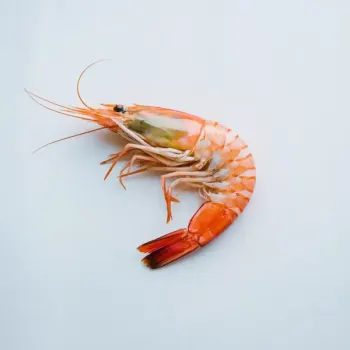Shrimp vs. Crabmeat is a comparison of two popular seafood choices, highlighting their culinary differences and uses in various dishes, from appetizers to soups, and providing nutritional insights, substitution tips, and answers to frequently asked questions for home cooks seeking to elevate their seafood recipes.

Shrimp are small, succulent crustaceans with a mild, slightly sweet flavor. They are versatile in cooking, able to be grilled, fried, sautéed, or steamed.

Crabmeat comes from the different species of crab found worldwide. It's known for its tender texture and rich, buttery flavor, often used in luxurious dishes.
Shrimp is generally firmer and can take on bold flavors well, while crabmeat is more delicate and often shines with subtle seasoning. Shrimp cooks quickly, ideal for fast meals, whereas crab is often enjoyed both in its pure form and as a component in more complex dishes. In terms of source, shrimp are widely available and farmed globally, whereas specific types of crab can be regional delicacies, like the Alaskan king crab.

Your ultimate Recipe Box, Meal Planner, and Cooking Class all in one
In appetizers, shrimp can be presented as cocktail shrimp, shrimp skewers, or as a topping on bruschetta, offering a firm bite and a crowd-pleasing appeal. Crabmeat is ideal for delicate appetizers like crab cakes, stuffed mushrooms, or as a luxurious dip, providing a rich and tender mouthfeel.
In salads, shrimp can be a hearty, protein-packed addition, perfect for a shrimp Caesar salad or a refreshing shrimp and avocado salad. Crabmeat's soft texture is excellent in a light crab salad with vinaigrette or mixed with greens and citrus for a sophisticated flavor profile.
Shrimp shines in soups and stews like gumbo, shrimp bisque, or a spicy Thai shrimp soup, adding robust flavor and a satisfying chew. Crabmeat elevates soups and stews, providing a delicate sweetness in dishes like she-crab soup, crab and corn chowder, or a rich seafood cioppino.
Both shrimp and crabmeat are low in fat and calories and high in protein, making them excellent choices for health-conscious seafood lovers.
| Nutrient | Shrimp ( per 100 grams ) | Crabmeat ( per 100 grams ) |
|---|---|---|
| Fat | 0.3g | 1.5g |
| Sodium | 111mg | 911mg |
| Protein | 24g | 21g |
| Calories | 99 | 97 |
| Cholesterol | 189mg | 78mg |
| Carbohydrates | 0.2g | 0g |
Both shrimp and crabmeat are nutritious; however, crabmeat is higher in sodium, while shrimp has more cholesterol. The best choice depends on your dietary needs.
Yes, you can substitute shrimp for crabmeat in a crab cake recipe, but the texture and flavor will be different. Finely chopping the shrimp can help mimic the texture of crabmeat.
No, shrimp generally cooks faster than crabmeat. Overcooking either can lead to a rubbery texture, so it's important to adjust cooking times accordingly.
Rich and creamy dishes like crab bisque or crab ravioli often benefit from crabmeat's delicate texture and flavor over shrimp.
Shrimp has a milder, slightly sweet flavor, while crabmeat is known for its rich, buttery taste with a hint of the sea.